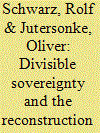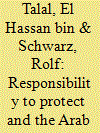| Srl | Item |
| 1 |
ID:
062568


|
|
|
| 2 |
ID:
098393


|
|
|
|
|
| Publication |
2010.
|
| Summary/Abstract |
The breakdown of order and the collapse of state institutions in fragile and failed states creates situations that may pose direct security threats for foreign actors. Whether and to what degree NATO should lead international efforts to address the dangers posed by failed states, typically far out-of-area, is a major debate for alliance purpose and strategy. While the alliance has focused its energy on aspects of the problem like counterterrorism and piracy, most action on fragile and failed states has been ad hoc, mainly military interventions and post-conflict reconstruction. The problem of dysfunctional states requires a broader rethinking for the international community and especially for NATO as it revaluates strategic goals. To more effectively provide security within the territorial boundaries of its member states the alliance needs to look at security beyond the Euro-Atlantic area. Shaping the political environment means an expanded NATO role in conflict prevention and in avoiding state failure before it occurs. It is argued here that this strategic perspective will not mean more interventions for NATO, but fewer. Moving away from intervening to stress prevention of state failure involves a change of focus: the development of capacities to anticipate problems and rebuild states, and to strengthen institutional capacities in states of strategic importance to the alliance.
|
|
|
|
|
|
|
|
|
|
|
|
|
|
|
|
| 3 |
ID:
119246


|
|
|
|
|
| Publication |
2013.
|
| Summary/Abstract |
Over the last 15 years, human rights concerns and development issues have been increasingly integrated with security matters on the international agenda. There is a growing understanding that justice, growth in welfare, and sustainable peace are goals that are deeply entwined. This new understanding of development - as encompassing human rights and security concerns to an equal extent - is reflected in the notion of the responsibility to protect. The responsibility to protect (R2P) represents a holistic approach to the challenges of international security, and one that enables human rights violations to be conceived of as a security issue. The arms embargo and humanitarian intervention in Libya and subsequent debate over intervention in Syria brought the issues of R2P into the heart of the Arab world. The Arab world has long been immune to these debates, but the historic changes in Tunisia and Egypt and the humanitarian intervention in Libya have shifted the debate and brought about a paradigm shift.
|
|
|
|
|
|
|
|
|
|
|
|
|
|
|
|